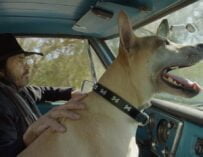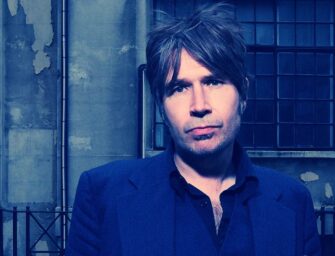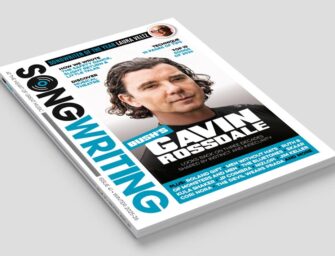
Nashvillains: Troy Johnson, Brett Boyett and Scott Lindsey join us for a natter about all things songwriting
In the first of a new regular feature, we sit down for a chat with a trio of talented writers
What happens when you take three hit songwriters hailing from Texas, Colorado and Kentucky and start a band? Troy Johnson, Brett Boyett and Scott Lindsey were all following their own career paths when they came together to form Nashvillains in Music City in 2019.
Several years on, they’re releasing music together and writing in their own self-described, “Rock meets outlaw country,” style which can be heard on current single, Tumbling Down, and upcoming release, Who Don’t.
With a debut album due out in autumn 2021, the trio are looking forward to getting back on the road, after a year of internet appearances during quarantine. Logging on to a Zoom call with Troy, Brett and Scott, Songwriting’s Martha L. Healy sat down to find out all about Nashvillains…
We want to know more about Nashvillains. How did you all start working together and how long have you been together as a band?
Troy Johnson: “I think it’s been about a year and a half. I met Scott several years ago when we both got signed to our publishing company and so he and I sat down to write some songs and it’s a good way to get to know somebody. And then Brett and I worked together outside of that, too.”
Brett Boyett: “Yeah, I was doing a movie and I was hiring Troy to sing all the demos for the movie.”
TJ: “Right, but that was all long-distance because you were in LA at the time, and it was by email and phone.”
BB: “Yeah, I’d never met you in person.”
Scott Lindsey: “I just happened to be in LA doing a songwriter’s festival and a mutual friend of ours, named Tim Gates, had a writing appointment with a guy called Brett Boyett and wanted to take me along with him and write for a movie called Forever My Girl. So, while we were writing that song – the song never made the movie, by the way…”
TJ: “He’s still holding that grudge, ha ha!”
SL: “My therapist says I’m almost over it.”
BB: “Well, the kicker was I was the music supervisor.”
SL: “After we wrote, we were hanging out and jamming and Brett was playing me some of his demos of the songs that were going to be in the movie, and I recognised Troy’s voice. Brett said, ‘I’m going to move to Nashville and I want this guy singing in my band if I can get him,’ and I said, ‘Is that Troy Johnson?’ and he goes, ‘Yeah,’ and I said, ‘Well, heck, I’d call him right now.’ So I called him up and Troy said, ‘Yeah, sure.’”
TJ: “Then, six months later or something, they came by my office and we all talked and decided it was something we wanted to pursue, and we made some plans to write, just to see what happened, and the very first song we came up with is going to be on the record.”
BB: “And the second one, we just released.”
TJ: “Yeah, so pretty much everything we’ve written together, at least in the beginning, has made the record, and is going to be pushed as singles. It was pretty apparent from the beginning that we had something going on.”
SL: “Yeah, writing is a lot like dating. Sometimes you go on a first date and you just don’t click with somebody. It’s nothing personal.”
TJ: “We have arguments and differences of opinion but there’s enough mutual respect that we can always come to an agreement of some sort.”
BB: “Well, it was cool, too, because we were coming to the table, all of us having had separate careers.”
TJ: “Right, yeah that’s a big difference.”
BB: “And we’re not twenty years old. We’re starting off but all three of us have had careers in different ways and we got together, and it just worked.”

Nashvillains’ Troy Johnson: “It was pretty apparent from the beginning that we had something going on.”
Let’s talk about your current single, Tumbling Down, and how the song evolved?
BB: “That was the second song we wrote. There was a lot of stuff going on in the world; dark clouds and tough years for the world and personally we had some struggles we were going through. I think that’s reflective in the narrative of that song. I think, to me, it’s more of a broad emotional overview of the struggles we’ve been going through – and everyone else.”
The song has some lovely traditional country instrumentation, with the dobro and acoustic guitar, but it’s also got a modern groove. How would you describe your sound and who are your biggest musical influences?
TJ: “I like to consider it as cinematic. My background, as far as production goes, I really admire the Peter Gabriels of the world, that kind of musical landscape. So, when Brett started putting Tumbling Down together, I was really pleased with how spacey it was and the atmospheric elements in it and I think what separates us from the pack, as far as country music goes, is that we do allow those more atmospheric elements. It’s not just boom-chick-boom. It’s produced in a more cinematic way, in a more audibly encompassing way so when you listen to it on phones, you kind of get enveloped in the sound. That’s the kind of music I listen to over and over again because then I can pick out different production elements that I missed the last time. It helps the ‘re-listening’ as much as the ‘original listening’.”
BB:” I’d say it’s less structural than the Nashville model of production. For me, I’m such a huge Pink Floyd and Beatles fan, those are kind of my wheelhouses – as well as country and southern rock.”
TJ: “Yeah, and I’d say Tumbling Down is probably less indicative of that. There’s more stuff coming in the future that is going to be more Pink Floyd-ish and a lot more atmospheric. We’ve got some strings on the record that nobody’s even heard yet and they’re freaking beautiful, and I can’t wait for that to get out there.”
BB: “It’s just a cool mixture of styles. Scott comes from the Kentucky bluegrass style, so a lot of the bluegrass instrumentation comes from him and the traditional country stuff, and Troy is very blues, rock and roll background and country and me, I am more pop and country.”
TJ: “He’s always wanting to put heavy guitars on it, which we’re fine with. I think country, the genre of country, allows that to happen. I don’t think you can necessarily do that in every genre out there. You know dance music is this, pop music is that, but the genre of country is so broad these days, you can get away with a lot and I hope to do that.”
BB: “That was definitely in the forefront of doing this band. We said, ‘If we’re going to do it, we’re going to do it differently and we’re going to do something that we would want to hear and we would want to buy and that we don’t think is out there.’ There’s a little bit of a missing element in the market right now that’s missing in country and that’s something we’re trying to present.”
SL: “I think a lot of it is we try to not get in the way of the song, when we’re writing or recording, we don’t get into the claps and the snaps so much and everything has to be structured. We let the song become the song and Brett’s great at finding all these crazy sounds we can use to make everything sound hip and modern, too.”
Can you give us any little hints at what we can expect from the debut album when it comes out later this year?
BB: “The full album’s going to be late-fall but we’ve got a bunch of singles before then. I think we’ll have about six singles by that point. We’re doing a lot of singles, but it will be out before the end of the year.”
SL: “Just in time for Christmas.”
BB: “We’ve got another big song, Chickasaw Bayou, coming up as a single later in the summer.”
TJ: “It’s a fun song to play and it was a fun song to write, and the track really came together and is indicative of what we do, of what we sound like and there are a lot more elements to it. It will fit Tumbling Down nicely and Who Don’t is a nice break from that or at least a nice transition from one to the other.”
SL: “So many songs!”

Nashvillains’ Troy Johnson: “The genre of country is so broad these days, you can get away with a lot.”
Have you toured together yet and is this part of the future?
SL: “Together, we’ve done just a little bit before Covid hit.”
TJ: “Yeah, we’ve done a little bit of full band stuff, mostly just the trio, which works great but when Covid hit, that shut – not just us – but pretty much everybody else down. We’re looking forward to getting back out there.”
You’ve all had successful careers individually and have written and produced music for films, TV shows, and major artists like The Chicks, Keith Urban, Cassadee Pope, James Taylor, Lauren Alaina, and many more… Do you have to wear a “different hat” when you’re doing this type of writing compared to how you write for the band?
TJ: “It’s a misnomer, the concept of actually writing for other people, as songwriters here in Nashville, I don’t know how it works in LA or NY, but the concept of actually ‘writing for someone’ is not really right. You may write a song with someone in mind, but the artists here aren’t hiring you to write for them.
“Some Days You Gotta Dance, by The Chicks, that was one of my songs I was so blessed that they cut. I certainly didn’t have anyone in mind when I wrote it. It was a song that popped out and it popped out really easily and it was early on in my career and it was a blessing that it even saw the light of day because it’s just a short little ditty that God was shining on. But as far as you guys go, artists don’t go, ‘Hey Scott, go and write me a song.’ I mean, if you’re in the room with an artist, that would be the difference and we’ve been in rooms with artists and you write for them, but you don’t always write for the artist, even if the artist is in the room. The worst thing a songwriter can hear is when the artist walks in the room and goes, ‘Maybe so-and-so can cut it,’ and we’re like, ‘We are here for you, why don’t you cut it?’”
BB: “I might be coming at it from a different angle, too, because I was more used to, ‘Here’s the script, write a bunch of songs with this movie in mind.’”
SL: “The closest Troy and I came to specifically writing for an artist was when we were writing with Kevin Costner and Jack Williams for Yellowstone [US TV Series].”
TJ: “Right, and in that regard, you do have to keep in mind the voice of the character and you do have to keep in mind what they might say. You have to be the actor yourself and embody what they’re talking about but, when it comes to day-to-day songwriting, you write with maybe an artist in mind, but it’s not like they’re asking you to do it; you just hope for the best.”
BB: “My Cassadee Pope single that I had, I wrote that for a film. It had nothing to do with her, and we just happened to have a plugger in Nashville that heard it and they said, ‘Hey I’ve got an artist who’s cutting today, I think I’m going to take it over to her, I think this is a cool song.’ And I had written it for a scene in a movie, it was a completely different thing. But then when I was writing with Drake Bell for his thing, we sat down and wrote a song for his record that was a specific sound and function. So, there are two answers, I guess.”
SL: “Of course, when we’re writing together, we’re writing specifically for Nashvillains.”
BB: “And that’s true, it’s very important for us and for our sound, where all our songs need to be pointed in that same direction. That is a big part of this, we can’t write some crazy leftfield song that’s not going to fit.”

Nashvillains’ Troy Johnson: “The more songs you put out there, the more opportunities you’ll have for cuts.”
So do you censor yourselves when you’re writing?
TJ: “I try not to. In fact, one of the things I say in a writing session is, ‘This may be stupid but I gotta get it out.”
SL: “And he’s usually right, ha ha…”
TJ: “You don’t want to censor yourself at all, it’s the same as creative writing, when you start a creative writing project, you just throw up on paper; you write and write and write and then you edit”
BB: “It’s funny, most Nashville writers have a book of hooks – or a phone of hooks now – where you write hooks as you go, as you live your daily life. So, when you got into a session you’ve got these hooks and sometimes, I open that book of hooks and I’m like, ‘What in the hell was I thinking? What has that got to do with anything?’”
TJ: “Yeah, I don’t even know what that even means! But ninety per cent of the time, you’ll throw it out in case it catches somebody’s ear. Somebody will have a different take on what that means.”
In Nashville, songwriting feels like a bit of an Olympic sport. Is there a lot of pressure to write hits all the time?
TJ: “Oh yeah, from the publisher, for sure.”
SL: “Definitely.”
BB: “And for the band now, it’s like we want to write the best songs – especially now it’s for our band – the pressure’s on even more.”
TJ: “We’ve been doing this for quite a long time, and the more you do it the more you understand what a hit is, and, in my mind, I feel like I naturally gravitate towards that direction. Whether or not it is a radio hit per se, it still has elements of that, and I tell you what, the biggest thing to remember in a town like this is the numbers game. The more songs you put out there, the more opportunities you’ll have for cuts.”
BB: “Yeah, but there’s a lot of people who write that much but they still won’t have a hit because they just don’t have the talent, you need the talent to back it up.”
TJ: “Yeah, but if they wrote less, they wouldn’t have a chance in the world. I would write a song and I would pore over the lyric and I would edit it and I would go back to it. Now, I try to finish the song and get to the next one and you never know what people are going to like. Some of the songs I can’t stand out of my catalogue, people love! But the ones I love, and think should be on the pedestal, people are like, ‘Yeah, it’s okay.’ You just never know and you’re always the worst critic of your own songs.”

Nashvillains’ Troy Johnson: “I’m very proud for Nashville to grow up as it did; it’s become a pretty iconic place whereas when I first got here, it didn’t hold that worldwide esteem.”
You’re all from different parts of America, yet you’ve settled in Nashville. What makes that city so special for music and songwriting?
SL: “I’ve been in and out of Nashville my whole life. I live an hour and a half north of town. My dad’s a singer-songwriter and we’d come down and he’d write with a guy named Tommy Collins and hung out with a guy named Johnny Russell and all these big writers, so I was always around it and I didn’t really know any better. I moved here myself to go to college, I went to Belmont, as did Troy.”
TJ: “Yeah, we’ve got two great colleges here that are good landing grounds for people coming in from different places called Belmont University and MTS Middle Tennessee State University. Both of those places have musical and engineering programmes, and, in fact, Belmont has a songwriting course. I wanted to go to Berklee in Boston, but it was just too expensive, and my parents couldn’t afford it, so I was in a band at that time and the producer moved to Nashville and he was telling my parents about Belmont, so we came up and visited and I fell in love. It was a great landing pad for a young adult to get acclimated to the town. Belmont is literally at the top of the (Music) Row, and you can walk down the Row and be a part of it.”
BB: “I moved here after college in Texas because I’d met George Jones’ bass player in Dallas and he and I had been writing songs and playing in country cover bands together. He was like, ‘Hey you should really move to Nashville; I know some folks there,’ and that’s what I did. I moved here and then I was in New York and LA doing films and stuff like that and then moved back here in the last two-and-a-half years. But you’re asking about why Nashville? Nashville has always inspired me as far as the level of musicianship and writing. It’s really important here and everyone’s doing this every day, five days a week and, also, the community is really close-knit; everyone knows everyone.”
TJ: “Yeah, the songwriting community is a very respected community in this town, it’s very coveted membership and that’s one of the things that attracted me. When I first came here, I was mainly a singer, I mean I did some songwriting but not much, but as I grew up I realised that the songwriting community holds a lot of respect in this town and – once I got that in my blood – I set out to write as many songs as I could and put together a demo and try to get a publishing deal and that’s how it all started.”
BB: “Just to explain, where we are just now, we’ve got hit writers coming in all day to record their songs and we’ve got the top session players in the world sitting out there playing for the top country records and…”
TJ: “It’s a wonderful concentration of talent here. It’s mind-blowing. I’m very proud for Nashville to grow up as it did; it’s become a pretty iconic place whereas when I first got here, it didn’t hold that worldwide esteem.”

Nashvillains’ Brett Boyett: “Some really good advice someone gave me who was a hit songwriter, for young songwriters, if they want to learn how to write hit songs, be in a cover band.”
Do you ever have times when your creativity needs some help? Writer’s block? If so, what types of things do you do to start writing again or take it in a new direction?
TJ: “Oh no, we never get writer’s block! [laughs] To answer your question: take a drive, go do something else, walk around the park, take a bike ride, go do something that will stimulate your surroundings.”
BB: “My suggestion would be to make yourself write. I mean sometimes you’ll write rubbish, but other times you’ll be like, ‘Wow!’ It’s a muscle, it’s something you must exercise and do constantly. I think you just have to power through it.”
TJ: “Yeah, there’s an aspect of this, you’ve got to force yourself into it, but in a writing session I’m always walking around, I can’t sit still, and I’ve got to get out of the room that I’m in. I’ve got to get away from the other writers to think about what needs to happen so I can come back and make suggestions. You’ve got to keep moving to stimulate the writing.”
SL: “Yeah, I pace a lot, too.”
TJ: “And the time of day is important, too. I find that really late at night, for some reason, my mind is creative.”
BB: “I’m early in the morning.”
TJ:: “And a good bottle of whisky always helps, as long as it’s Scotch.”
What’s the best piece of songwriting advice you’ve ever had?
BB: “Some really good advice someone gave me who was a hit songwriter, for young songwriters, if they want to learn how to write hit songs, be in a cover band.”
TJ: “That’s good!”
BB: “Because you get used to playing hit songs every single night and you get used to the structure and the melody and the lyrics and I think that was really good advice.”
TJ: “Imitation is the best way to learn in music and, I imagine, creativity, in general.”
SL: “I always wrote the lyrics out in pencil on paper and just studied. My favourite songwriter at the time was Rodney Crowell and I’d write his lyrics out and I’d study his rhyme schemes and how he tied thoughts together and all that stuff. Every aspect of the song, I’d study. You’ve got to be a student of it, always.”
BB: “And on top of that, associate yourself with other writers who compliment you and can do things that you’re not as good at. If you’re a better music person, get with a lyricist: if you’re a better lyrical person, get with a better music person. There are all kinds of things that are smart business moves as well.”
SL: “Co-writing is very important.”
BB: “And that’s a very Nashville thing as well. It’d be cool to do some across the pond writing, too!
Your next single is out on 14 May – what can we look forward to with this one?
BB: “This song, we actually did not write.”
TJ: “This is a departure for us, we have a songwriting friend who, unfortunately, passed several years ago and his father, Stephen Dorff, is the producer of this track. His son, Andrew Dorff, wrote this with a couple of friends and this was a labour of love and we wanted to cut this for Andrew and his family and be a part of that legacy. We are very proud of the song, Who Don’t and are looking forward to it all.”
Interview: Martha L. Healy































Related Articles